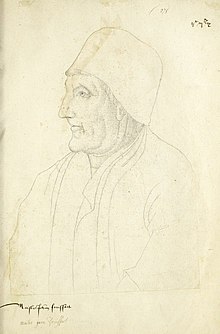Jean Froissart
| Jean Froissart | |
|---|---|

Posthumous portrait of Jean Froissart, "Recueil d'Arras", Jacques Le Boucq
|
|
| Born | c. 1337 Valenciennes, County of Hainaut, Holy Roman Empire |
| Died | c. 1405 (aged 67-68) Chimay, County of Hainaut, Holy Roman Empire |
| Occupation | author and court historian |
Jean Froissart (Old French, Middle French , c. 1337 – c. 1405) was a French-speaking medieval author and court historian from the Low Countries, who wrote several works, including Chronicles and Meliador, a long Arthurian romance, and a large body of poetry, both short lyrical forms, as well as longer narrative poems. For centuries, Froissart's Chronicles have been recognised as the chief expression of the chivalric revival of the 14th century Kingdom of England and Kingdom of France. His history is also an important source for the first half of the Hundred Years' War.
What little is known of Froissart's life comes mainly from his historical writings and from archival sources which mention him in the service of aristocrats or receiving gifts from them. Although his poems have also been used in the past to reconstruct aspects of his biography, this approach is in fact flawed, as the 'I' persona which appears in many of the poems should not be construed as a reliable reference to the historical author. This is why de Looze has characterised these works as 'pseudo-autobiographical'. Froissart came from Valenciennes in the County of Hainaut, situated in the western tip of the Holy Roman Empire, bordering France. Earlier scholars have suggested that his father was a painter of armorial bearings, but there is actually little evidence for this. Other suggestions include that he began working as a merchant but soon gave that up to become a cleric. For this conclusion there is also no real evidence, as the poems which have been cited to support these interpretations are not really autobiographical.
By about age 24, Froissart left Hainault and entered the service of Philippa of Hainault, queen consort of Edward III of England, in 1361 or 1362. This service, which would have lasted until the queen's death in 1369, has often been presented as including a position of court poet and/or official historiographer. Based on surviving archives of the English court, Croenen has concluded instead that this service did not entail an official position at court, and probably was more a literary construction, in which a courtly poet dedicated poems to his 'lady' and in return received occasional gifts as remuneration.
...
Wikipedia
